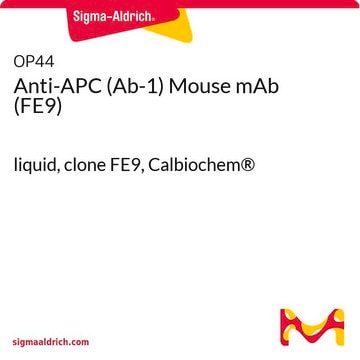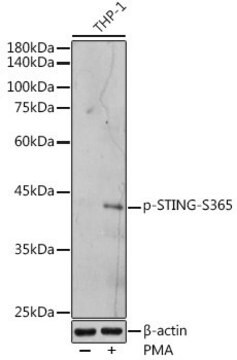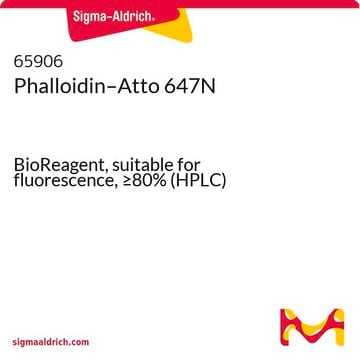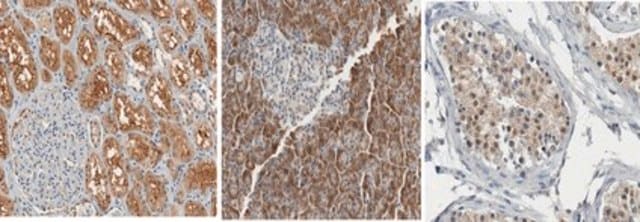OP45
Anti-DCC Mouse mAb (AF5)
Synonim(y):
Anti-Deleted Colorectal Carcinoma
Zaloguj sięWyświetlanie cen organizacyjnych i kontraktowych
About This Item
Polecane produkty
forma przeciwciała
purified antibody
Poziom jakości
klon
AF5, monoclonal
Postać
liquid
zawiera
≤0.1% sodium azide as preservative
reaktywność gatunkowa
human
izotyp
IgG1
Opis ogólny
Invasive, metastatic colon cancer arises from pre-existing adenomas in both familial and sporadic cases and is characterized by the presence of multiple chromosomal alterations. In the progression from intramucosal carcinoma to invasive carcinoma, allelic loss on the long arm of chromosome 18 is frequently observed. Recently, a gene on 18q21.3 termed DCC, for deleted in colorectal carcinoma, has been isolated and shown to be deleted or mutated in both sporadic and inherited colon carcinoma whereas normal colonic tissue retained and expressed the gene. Furthermore, loss of DCC expression appears to accompany progression of adenomas to metastatic carcinoma. The inactivation of DCC suggests that it is a tumor suppressor gene. A functional role for DCC as a tumor suppressor gene is indicated by experiments demonstrating that introduction of a normal chromosome 18 into the human colon tumor cell lines COKFu or SW480.7 lacking DCC suppresses tumorigenicity. Analysis of the amino acid sequence deduced from cDNA clones indicates that DCC is a transmembrane glycoprotein consisting of 1447 amino acids with an extracellular domain having extensive similarity to neural cell adhesion molecules (NCAM), a single transmembrane segment, and a unique cytoplasmic domain. The high degree of similarity to NCAMs suggests that DCC is involved in cell-cell interactions essential to the differentiated state of the colonic epithelium. DCC expression has been observed in all tissues examined except liver with the highest level of expression in brain tissue. Alterations in DCC expression have also been observed in pancreatic adenocarcinoma and esophogeal carcinoma. However, DCC mRNA is expressed at very low levels, requiring reverse transcription followed by PCR amplification for unambiguous detection.
Purified mouse monoclonal antibody. Recognizes the ~190 kDa DCC protein.
Recognizes the ~190 kDa DCC protein in IMR32 cells.
Immunogen
the extracellular domain of human DCC
Zastosowanie
Immunoblotting (1-5 μg/ml)
Immunofluorescence (1-5 μg/ml)
Immunoprecipitation (1-2 μg/sample)
Immunofluorescence (1-5 μg/ml)
Immunoprecipitation (1-2 μg/sample)
Postać fizyczna
In 0.05 M sodium phosphate buffer, 0.2% gelatin.
Komentarz do analizy
Negative Control
SW480 cells
SW480 cells
Positive Control
IMR32 cells
IMR32 cells
Inne uwagi
IMMUNOBLOTTING PROCEDURE
Anti-DCC (Ab-1) can be used to immunoblot proteins previously separated by sodium dodecyl sulfate-polyacrylamide gel electrophoresis and electrophoretically transferred onto nitrocellulose membranes. The proteins a
Ta strona może zawierać tekst przetłumaczony maszynowo.
Certyfikaty analizy (CoA)
Poszukaj Certyfikaty analizy (CoA), wpisując numer partii/serii produktów. Numery serii i partii można znaleźć na etykiecie produktu po słowach „seria” lub „partia”.
Masz już ten produkt?
Dokumenty związane z niedawno zakupionymi produktami zostały zamieszczone w Bibliotece dokumentów.
A genetic model for colorectal tumorigenesis.
E R Fearon et al.
Cell, 61(5), 759-767 (1990-06-01)
Y Huang et al.
Cancer research, 52(23), 6525-6530 (1992-12-01)
Loss of heterozygosity occurring on various chromosomes has been described in the majority of human tumors. The targets of frequent or consistent subchromosomal deletions are believed to be tumor suppressor genes. We examined 72 esophageal tumors (46 squamous cell carcinomas
M W Höhne et al.
Cancer research, 52(9), 2616-2619 (1992-05-01)
The development of colon carcinomas is associated with allelic deletions on chromosomes 5q, 17p, and 18q. The DCC gene located on chromosome 18q21.3 codes for a potential tumor suppressor gene related to cellular adhesion receptors. We investigated the expression of
K Tanaka et al.
Nature, 349(6307), 340-342 (1991-01-24)
Development of colon carcinomas can be associated with allelic deletions on several chromosomes, including 5q and 18q. The APC gene on 5q and the DCC gene on 18q have been identified as potential tumour suppressor genes, whose suppression contributes to
M G Dunlop
Seminars in cancer biology, 3(3), 131-140 (1992-06-01)
Due to the accessibility of the intermediate steps in the progression of colorectal cancer and to the existence of heritable susceptibility to the disease, molecular genetic analysis of colorectal carcinogenesis seems likely to answer many of the questions concerning the
Nasz zespół naukowców ma doświadczenie we wszystkich obszarach badań, w tym w naukach przyrodniczych, materiałoznawstwie, syntezie chemicznej, chromatografii, analityce i wielu innych dziedzinach.
Skontaktuj się z zespołem ds. pomocy technicznej








